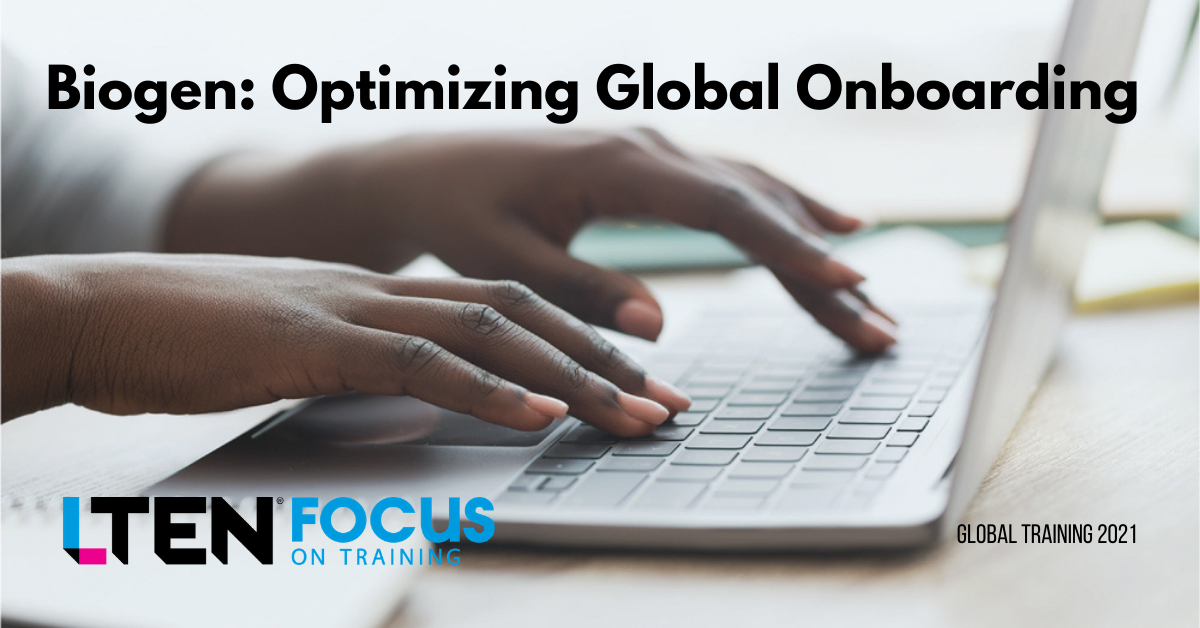
Biogen: Optimizing Global Onboarding
Feature Story – By Glenna Griffin and Drew Turner Oppelt
Inside Biogen’s ambitious workstream to harmonize global onboarding
 Experiencing global organizational expansion, the Biogen Enterprise Learning team faced a challenge. The team recognized that for greater consistency in the learning space for employees, greater alignment of content and delivery of our learning materials was required. This alignment would provide greater results in learning as well as provide cost reductions in learning expenses as content would be scalable at a global level. The increase in new employees onboarding made this effort especially vital.
Experiencing global organizational expansion, the Biogen Enterprise Learning team faced a challenge. The team recognized that for greater consistency in the learning space for employees, greater alignment of content and delivery of our learning materials was required. This alignment would provide greater results in learning as well as provide cost reductions in learning expenses as content would be scalable at a global level. The increase in new employees onboarding made this effort especially vital.
To meet this need, in 2020, the Biogen Enterprise Learning U.S. Organization & Biogen Intercontinental Region (BIR) Commercial Learning Teams partnered with the Biogen Enterprise Learning Optimization Team’s Learning Design Center of Excellence (COE) to begin an ambitious workstream to harmonize field team onboarding for the global organization. The goal of the program was to prepare new hires joining field operations to interface consistently with customers, while still allowing for localization based on market and regional needs.
Creating a Consistent Process
Biogen, headquartered in Cambridge, Mass., and home to more than 9,000 employees globally, is a recognized leader in the neuroscience research and therapeutic areas.
While a rigorous onboarding learning plan was well-established in the United States across the distinct markets, the Biogen team focused on creating a consistent learning process to upskill new hires on disease and promotional resources globally. The learning team wanted every new employee to have access to consistent learning materials for key lines of therapeutics, regardless of region or language.
Biogen was also preparing to launch additional medications in differentiated and new disease state verticals across the globe, which required additional new resources that needed global alignment. To streamline and create continuity in the learning process, key aspects were identified for the scope of the project to drive impact, scale implementation and measure key outcomes in the process.
Step 1: Alignment
The first step in the process was to gain alignment across Biogen’s HR and enterprise learning structure. A core team was established to handle project management, content review and provide expert learning perspectives tied to disease state and branded therapies. A strong communication plan with key stakeholders in the process was critical to maximize resources, align the scope of the mission and to have key advocates in the process from the very beginning.
While some regions of the world had very well-established learning plans and experienced learning partners, there were other parts of the world with new affiliates, new products or new colleagues on the learning teams. This created a sense of urgency to build the new content in a way that would allow for easier translation and updating to local labels.
 Step 2: Partnership
Step 2: Partnership
The next action was to partner with our global vendor, NIIT, to guide us through the process to shape the future of learning on a global scale. Our partner was able to provide objectivity across the learning plans to analyze the assets and identify alignment and/or gaps. They also managed the communication with the global stakeholders and managed the timeline for the review of materials. It was imperative to clearly lay out the scope, goals and timelines for the project, but also to define a structure for meetings and feedback sessions as the team worked toward global harmonization.
Learning experts within the global training program were identified to serve as reviewers to represent the diversified regions the project would impact and to the specific disease states. Their task was to assess whether the learning content applied to a specified region or not, and to seek out ideas about training content missing from the curriculum that should be part of future training development. The process also would determine which of Biogen’s onboarding assets should be part of a regional curriculum as is, or with appropriate attention to critical market requirements.
Historically, Biogen’s global ECP (Europe, Canada & Partner Markets) affiliates have successfully navigated onboarding learning within their specific region, aligned to cultural and regulatory needs. It was a priority when creating our partnership plan to recognize the outstanding existing work created and facilitated by our affiliate teams and to educate the teams on additional assets that would provide value to their existing programs. The focus of this project overall was to build upon existing curriculums so that we were maximizing resources for our new employees. Recognizing the outstanding work already being done in the individual regions and sharing those assets from the affiliates to other regions was an important focus of the project as well.
Step 3: Analyzing the Feedback
Creating continuity in the feedback process was the next goal to quantify the feedback and to have a frame of reference for resources with different titles, but similar content. To address this component, a core feedback sheet was developed to create structured guidance to the reviewer team for feedback continuity and to start building the framework of resources for the global onboarding plan in real time.
Once the review process was in full motion, regular status meetings with the core project team and supplier were implemented to conduct quality control checks, fill out the team dashboard or deliverables, maintain momentum, address ongoing questions and to develop an executive summary for key milestones with leadership.
The core team established a cadence of key deliverables that was set to an expedited timeline. Setting a streamlined timeline became a critical implementation component because of the core contributors’ schedules changing and to maintain a sense of project priority with everyone’s busy schedules.
The resulting feedback will help the learning team gain clarity into the overall onboarding learning that is available to new Biogen employees around the world. It will also clearly identify potential gaps in a particular region, a particular therapeutic line or perhaps key messaging that is missing translation so that it is accessible in every region.
Step 4: Global Consistency and Framework
The final step of this project is to promote the overall consistent core onboarding programming available to Biogen employees regardless of region or therapeutic focus. While regions may add in additional supportive elements to map to cultural or regional needs, all will be operating from the same fundamental framework.
One benefit of this consistency is that our commercial new hires are all on the same page regardless of global location with the information they need to create impact more quickly. Additionally, learning assets were identified that could be reused in other regions to avoid duplication of effort and costs to create new learning.
Overall, the collaboration and partnership of the commercial learning team, the learning optimization team and our supplier partner provided greater output and streamlined the project overall. The effort of this project is monumental. Yet we believe the project is critical for our employees, our business and our patients. When new hire employees are onboarded in a manner that truly provides them with all the best learning tools, they will have everything they need to care deeply, work fearlessly and ultimately change lives.
Glenna Griffin is head of the Learning Design Center of Excellence for Biogen Enterprise Learning. Email Glenna at glenna.griffin@biogen.com. Drew Turner Oppelt is head of Biogen Intercontinental Region (BIR) Learning (LATAM, APAC, MART, Japan, ANZ). Email Drew at drew.oppelt@biogen.com.








